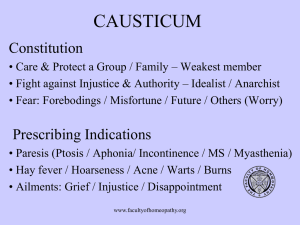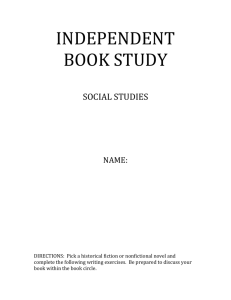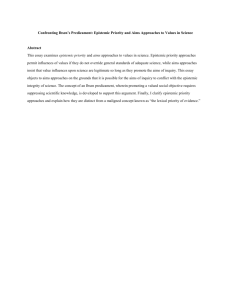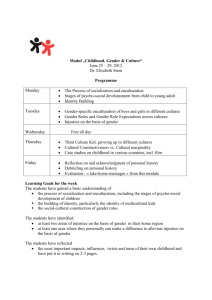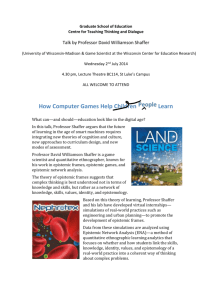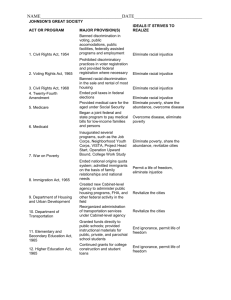Chapter One: Introduction
advertisement
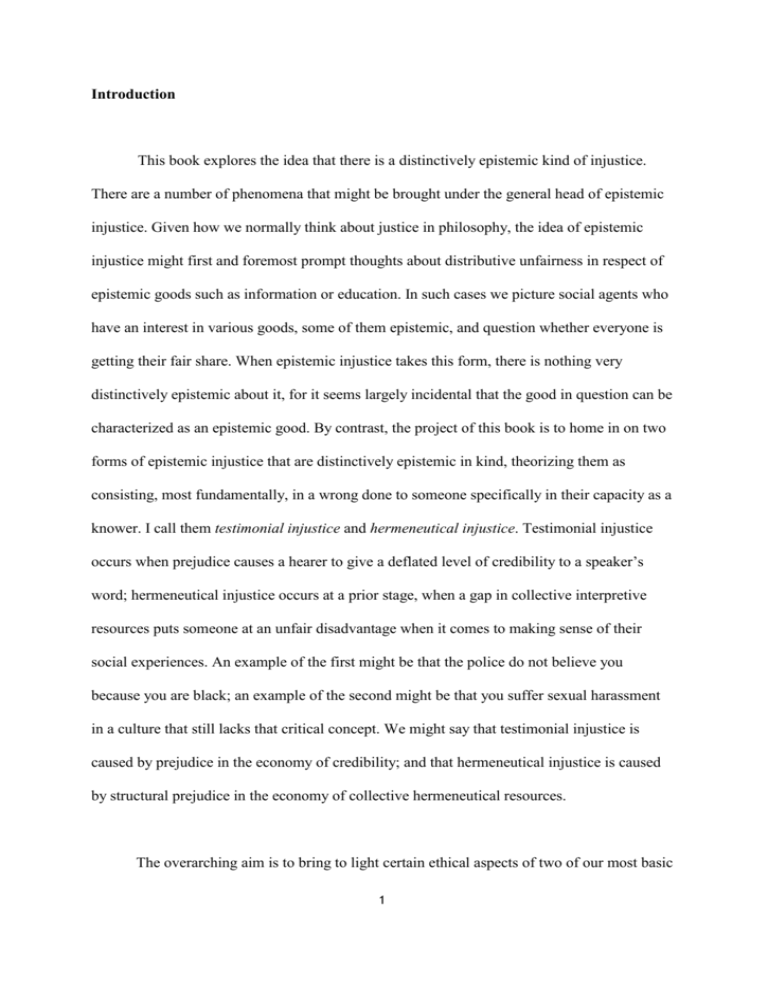
Introduction This book explores the idea that there is a distinctively epistemic kind of injustice. There are a number of phenomena that might be brought under the general head of epistemic injustice. Given how we normally think about justice in philosophy, the idea of epistemic injustice might first and foremost prompt thoughts about distributive unfairness in respect of epistemic goods such as information or education. In such cases we picture social agents who have an interest in various goods, some of them epistemic, and question whether everyone is getting their fair share. When epistemic injustice takes this form, there is nothing very distinctively epistemic about it, for it seems largely incidental that the good in question can be characterized as an epistemic good. By contrast, the project of this book is to home in on two forms of epistemic injustice that are distinctively epistemic in kind, theorizing them as consisting, most fundamentally, in a wrong done to someone specifically in their capacity as a knower. I call them testimonial injustice and hermeneutical injustice. Testimonial injustice occurs when prejudice causes a hearer to give a deflated level of credibility to a speaker’s word; hermeneutical injustice occurs at a prior stage, when a gap in collective interpretive resources puts someone at an unfair disadvantage when it comes to making sense of their social experiences. An example of the first might be that the police do not believe you because you are black; an example of the second might be that you suffer sexual harassment in a culture that still lacks that critical concept. We might say that testimonial injustice is caused by prejudice in the economy of credibility; and that hermeneutical injustice is caused by structural prejudice in the economy of collective hermeneutical resources. The overarching aim is to bring to light certain ethical aspects of two of our most basic 1 everyday epistemic practices: conveying knowledge to others by telling them, and making sense of our own social experiences. Since the ethical features in question result from the operation of social power in epistemic interactions, to reveal them is also to expose a politics of epistemic practice. Ideas with a politicizing portent for how we think about our epistemic relations—ideas such as that epistemic trust might have an irrepressible connection with social power, or that social disadvantage can produce unjust epistemic disadvantage—tend not to feature in the context of anglo-american epistemology. Perhaps they are not featured because they are presumed to be necessarily allied with the relativistic outlook of which postmodernism was the apotheosis, or perhaps simply because the theoretical framework of individualism and compulsory rational idealization that epistemology traditionally creates for itself makes it very hard to see how such questions might have a bearing on epistemology proper. Whatever the explanation, it is an impetus of this book that epistemology as it has traditionally been pursued has been impoverished by the lack of any theoretical framework conducive to revealing the ethical and political aspects of our epistemic conduct. Within the anglo-american tradition, feminist epistemology has been rather a solitary voice as it bravely insisted on this point, though I hope to show that virtue epistemology provides a general epistemological idiom in which these issues can be fruitfully discussed. One finds a similar blind spot in ethics, and it does seem equally a pity that ethics has not traditionally taken our epistemic conduct into its remit. In the ethics case, however, the inattention to the rights and wrongs of our epistemic lives seems more contingent and not conducive to any special diagnostic comment beyond the general observation that there has been a historical preoccupation with the second-order. One way or another, given the traditional background, this book is neither straightforwardly a work of ethics nor 2 straightforwardly a work of epistemology; rather it renegotiates a stretch of the border between these two regions of philosophy. A philosophical literature that did seem, notably to many feminist philosophers, to promise a theoretical space in which to investigate the ethics and politics of our epistemic practices was that of postmodernism. A crucial attraction of postmodernist philosophical thought was that it placed reason and knowledge firmly in the context of social power. Ageold worries about the authority of reason gained a new, seemingly radicalizing theoretical context in which they could be played out in a more political key. But this turned out to be largely a vain hope, for the extremist bent in so much postmodernist writing led too often to reductionism, and the driving force behind the postmodernist spirit emerged as more a matter of disillusionment with untenable ideals of reason than any real will to bring questions of justice and injustice to bear in reason’s entanglements with social power.1 Suspicion of the category of reason per se and the tendency to reduce it to an operation of power actually preempt the very questions one needs to ask about how power is affecting our function as rational subjects; for it eradicates, or at least obscures, the distinction between what we have a reason to think, and what mere relations of power are doing to our thinking. If one has an interest in how questions of justice might present themselves in relation to our epistemic practices, the reductionist tendency obscures essential distinctions between, say, rejecting someone’s word for good reason and rejecting it out of mere prejudice. Far from opening up theoretical space in which to explore questions of justice and power in epistemic practices, then, postmodernism effectively pre-empted such questions, and so what it had to say of an epistemological bearing did not ultimately go in a progressive direction at all, but was if anything orientated towards conservatism. 3 But we must not allow there to be mere silence where there was once a postmodernist buzz, for we can surely find other, better ways of discussing reason’s entanglements with social power. What form, we might ask, should such discussion take? One answer to this question is that it should take the form of asking first-order ethical questions in the context of socially situated accounts of our epistemic practices.2 A socially situated account of a human practice is an account such that the participants are conceived not in abstraction from relations of social power (as they are in traditional epistemology, including most social epistemology) but as operating as social types who stand in relations of power to one another. This socially situated conception makes questions of power and its sometimes rational, sometimes counterrational rhythms arise naturally as we try to account for the epistemic practice itself. Many philosophical questions may be best served by the traditional, maximally abstracted conception of the human subject, but confining oneself to that conception restricts the sorts of philosophical questions and insights we can come up with, so that the philosophical repertoire incurs a needless impoverishment. Starting from the socially situated conception, however, allows us to trace some of the interdependencies of power, reason, and epistemic authority in order to reveal the ethical features of our epistemic practices that are integral to those practices. Ultimately, the point is to see how our epistemic conduct might become at once more rational and more just. Throughout the book I make use of the concept of social power, and so my first task in chapter 1 is to define a working conception. The conception I arrive at is fairly broad, and the core idea is that power is a socially situated capacity to control others’ actions. I then introduce a sub-species of social power that I call identity power—a form of social power 4 which is directly dependent upon shared social-imaginative conceptions of the social identities of those implicated in the particular operation of power. The rest of chapter 1 is devoted to presenting the main idea of the book in that it characterizes the primary form of epistemic injustice: testimonial injustice. The basic idea is that a speaker suffers a testimonial injustice just if prejudice on the hearer’s part causes him to give the speaker less credibility than he would otherwise have given. Since prejudice can take different forms, there is more than one phenomenon that comes under the concept of testimonial injustice. I introduce the notion of identity prejudice as a label for prejudices against people qua social type, and this allows me to home in on the central case of testimonial injustice: the injustice that a speaker suffers in receiving deflated credibility from the hearer owing to identity prejudice on the hearer’s part; as in the case where the police don’t believe someone because he is black. Thus the central case of testimonial injustice can be defined (if rather telegraphically) as identityprejudicial credibility deficit. This definition captures the kind of testimonial injustice that is connected up with other forms of social injustice that the subject is likely to suffer, and that is what makes it the central case—it is central from the point of view of revealing the place of epistemic injustice in the broader pattern of social injustice. Chapter 2 takes up the question of how identity prejudice gets into hearers’ judgements of speakers’ credibility, often despite rather than because of their beliefs. I suggest that such prejudices typically enter into a hearer’s credibility judgement by way of the social imagination, in the form of a prejudicial stereotype—a distorted image of the social type in question. And I make an initial proposal (the full argument for which is given in chapter 3) to the effect that a spontaneous credibility judgement is a matter of the hearer perceiving her interlocutor as credible to this or that degree, so that when prejudice enters in it ordinarily 5 does so by way of a prejudicial stereotype distorting this epistemically loaded social perception. Any claim of injustice must rely on shared ethical intuition, but we achieve a clearer idea of why something constitutes an injustice if we can analyse the nature of the wrong inflicted. The analysis I give of the wrong done to the speaker in testimonial injustice relates it to the wrong done in epistemic injustice taken generally: any epistemic injustice wrongs someone in their capacity as a subject of knowledge, and thus in a capacity essential to human value; and the particular way in which testimonial injustice does this is that a hearer wrongs a speaker in his capacity as a conveyor of knowledge, as an informant. I argue that the primary harm one incurs in being wronged in this way is an intrinsic injustice. Clearly, this harm may go more or less deep in the psychology of the subject, and I explore the idea that, where it goes deep, it can cramp self-development so that a person may be, quite literally, prevented from becoming who they are. In chapter 3 I situate the phenomenon of testimonial injustice in the epistemology of testimony. A non-inferentialist position is developed in a virtue epistemological frame by way of a parallel between the hearer’s perception of the speaker and the moral cognitivist conception of the virtuous person as endowed with a capacity for moral perception. I argue that just as the moral subject is depicted as perceiving the world in a morally charged way, so the virtuous hearer in a testimonial exchange perceives her interlocutor in an epistemically charged way—she perceives him as credible to this or that degree. The idea of a testimonial sensibility is introduced as a form of rational sensitivity that is socially inculcated and trained by countless experiences of testimonial exchange, individual and collective. This real-life 6 training instils in the virtuous hearer empirically well-grounded habits of epistemically charged social perception, and thus reliable perceptual judgements of speaker credibility. But our predicament as hearers is that even if we were personally innocent of prejudiced beliefs, still the social atmosphere in which we must judge speakers’ credibility is one in which there are inevitably many stray residual prejudices that threaten to influence our credibility judgements, and so the primary conception of the virtuous hearer must be that of someone who reliably succeeds in correcting for the influence of prejudice in her credibility judgements. With the general conception of a virtuous hearer in place I go on, in chapter 4, to present one testimonial virtue in particular, namely the virtue of testimonial justice—a virtue such that the influence of identity prejudice on the hearer’s credibility judgement is detected and corrected for. The genealogical origins of this virtue are then traced in chapter 5. Using first Bernard Williams’s and then Edward Craig’s epistemic State of Nature stories I argue that testimonial justice emerges in the State of Nature as an original ‘virtue of truth’.3 The structure of the virtue is then specified, and the virtue is revealed as hybrid in kind: both intellectual and ethical. In chapter 6 I revisit the question of the wrong that testimonial injustice inflicts, this time examining it through the lens of the State of Nature story about the origins of the concept of knowledge. I argue we can understand the wrong in terms of epistemic objectification, and I explain that notion by way of a parallel with a feminist conception of sexual objectification and the associated phenomenon of ‘silencing’. I then argue that it follows from Craig’s ‘practical explication’ of the concept of knowledge that the wrong of testimonial injustice cuts conceptually deeper than anything we had so far envisaged: a matter of exclusion from the very practice that constitutes the practical core of what it is to know. 7 Finally, chapter 7 addresses the second kind of epistemic injustice that I want to explore: hermeneutical injustice. A central case of this sort of injustice is found in the example of a woman who suffers sexual harassment prior to the time when we had this critical concept, so that she cannot properly comprehend her own experience, let alone render it communicatively intelligible to others. I explain this sort of epistemic injustice as stemming from a gap in collective hermeneutical resources—a gap, that is, in our shared tools of social interpretation—where it is no accident that the cognitive disadvantage created by this gap impinges unequally on different social groups. Rather, the unequal disadvantage derives from the fact that members of the group that is most disadvantaged by the gap are, in some degree, hermeneutically marginalized—that is, they participate unequally in practices through which social meanings are generated. This sort of marginalization can mean that our collective forms of understanding are rendered structurally prejudicial in respect of content and/or style: the social experiences of members of hermeneutically marginalized groups are left inadequately conceptualised and so ill understood, perhaps even by the subjects themselves; and/or attempts at communication made by such groups, where they do have an adequate grip on the content of what they aim to convey, are not heard as rational owing to their expressive style being inadequately understood. As in the discussion of testimonial injustice, I offer a characterization of the wrong done to the person involved. The nature of the primary harm caused by hermeneutical injustice is analysed as a matter of someone suffering from a situated hermeneutical inequality: their social situation is such that a collective hermeneutical gap prevents them in particular from making sense of an experience which it is strongly in their interests to render intelligible. 8 While hermeneutical injustice is not perpetrated by individuals, it will normally make itself apparent in discursive exchanges between individuals. There is therefore something to be said about what virtue is called for on the part of the hearer. She cannot be blamed for a certain initial lack of trust she may feel towards the testimony of someone whose communicative labours are hampered by hermeneutical injustice, since some such lack of trust is epistemically justified—both speaker and hearer are labouring with the same inadequate tools. But the epistemic goal of understanding would none the less be served by an intellectual virtue of hermeneutical justice being incorporated into the hearer’s testimonial sensibility. This virtue is such that the hearer exercises a reflexive critical sensitivity to any reduced intelligibility incurred by the speaker owing to a gap in collective hermeneutical resources. That is, he is alert to the possibility that her relative unintelligibility to him is a function of a collective hermeneutical impoverishment, and he adjusts or suspends his credibility judgement accordingly. On the face of it, this virtue is intellectual and not ethical. But I argue that on closer inspection the virtue reveals itself also to be an ethical virtue. Like testimonial justice, the virtue of hermeneutical justice is a hybrid. The main aim of the book is to get acquainted with two forms of epistemic injustice: testimonial injustice, in which someone is wronged in their capacity as a conveyor of knowledge; and hermeneutical injustice, in which someone is wronged in their capacity as a subject of social understanding. I think there is a lot to be gained philosophically by concentrating on the normality of injustice, and one of the gains might be that we achieve a better grasp of what is required in practice to operate in a way that works against it. This hope is what inspires the discussion of the two corrective ethical-intellectual virtues, virtues which stand to improve our lives as subjects and objects of knowledge. There is a limit of course to 9 what virtues on the part of individuals can achieve when the root cause of epistemic injustice is structures of unequal power and the systemic prejudices they generate. Eradicating these injustices would ultimately take not just more virtuous hearers, but collective social political change—in matters of epistemic injustice, the ethical is political. Still, this simply underlines the fact that testimonial and hermeneutical injustice must first be explored as ethical problems, for that is what they most fundamentally are. In terms of our philosophical understanding of these phenomena, the political depends upon the ethical. 10 1 I have argued for these claims in ‘Pluralism Without Postmodernism’ in M. Fricker and J. Hornsby (eds.) The Cambridge Companion to Feminism in Philosophy (Cambridge: Cambridge University Press, 2000). 2 ‘Socially situated’: This term is widely used in feminist philosophy, but the first use that I am aware of is by Donna Haraway (see Haraway, ‘Situated Knowledges: The Science Question in Feminism and the Privilege of Partial Perspective’, Feminist Studies 14/3 (1988) 575-99; reprinted in Evelyn Fox Keller & Helen Longino (eds.) Feminism and Science (Oxford: Oxford University Press, 1996). 3 ‘Virtue of truth’ is Bernard Williams’s phrase (Truth and Truthfulness. An Essay in Genealogy (Princeton: Princeton University Press, 2002). 11


